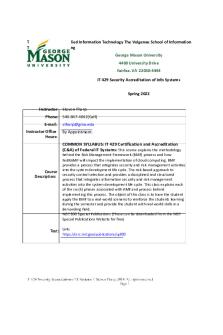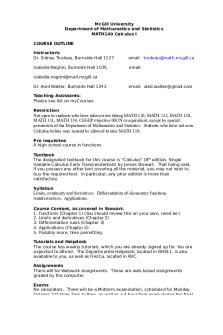IT 140 Syllabus spring 2022 PDF

| Title | IT 140 Syllabus spring 2022 |
|---|---|
| Author | Pete Ivey |
| Course | Intro To Scripting |
| Institution | Southern New Hampshire University |
| Pages | 6 |
| File Size | 214.8 KB |
| File Type | |
| Total Downloads | 77 |
| Total Views | 140 |
Summary
Undergraduate Course Syllabus
IT 140: Introduction to Scripting
Center: Online
Course Prerequisites
None
Course Description
Students will learn the fundamentals of programming concepts, including data types, variables, decision
statements, loops, functions,...
Description
Undergraduate Course Syllabus IT 140: Introduction to Scripting Center: Online Course Prerequisites None Course Description Students will learn the fundamentals of programming concepts, including data types, variables, decision statements, loops, functions, and file handling. By developing simple scripts, students will understand how to use common scripting language constructs including lists, literals, and regular expressions to build useful applications. Course Competencies This course covers the following competencies, which represent the knowledge and skills relevant to your field:
CS-20292: Translate requirements to solve problems computationally
CS-10293: Write scripts using syntax and conventions in accordance with industry standard best practices
CS-20294: Develop a fully functional program using industry-relevant tools
Required Materials Using your learning resources is critical to your success in this course. Please purchase directly through the SNHU Online Bookstore rather than any other vendor. Purchasing directly from the bookstore ensures that you will obtain the correct materials and that the IT Service Desk, your advisor, and the instructor can provide you with support if you have problems. zyBooks To access your zyBooks resource, complete the steps outlined in the course announcements area. Introduction to Scripting Southern New Hampshire University zyBooks ISBN: 978-1-394-02896-2 Diversity, Equity, and Inclusion As indicated in our core values, SNHU is committed to “embrace diversity where we encourage and respect diverse identities, ideas, and perspectives by honoring difference, amplifying belonging, engaging civilly, and breaking down barriers to bring our mission to life.”
Page | 1
S yll ab us L as t Up da te d 1 0 / 1 4 / 2 0 2 1
This may or will be reflected in SNHU’s curriculum as we embrace and practice diversity, equity, and inclusion (DEI) to provide the most transformative experience for our students, faculty, and staff. Because topics pertaining to DEI can be sensitive, please remember that embodying and practicing diversity, equity, and inclusion is one of our core values that you will encounter throughout the academic experience. In higher education, we are expected to think and engage critically. Use a growth mindset to embrace the diverse readings, course assignments, and experiences of your peers and faculty. For more information about DEI at SNHU, please visit our website at the Office of Diversity and Inclusion. Instructor Availability and Response Time Your class interaction with the instructor and your classmates will take place on a regular, ongoing basis. Your instructor will be actively engaged within the course throughout the week. You will normally communicate with your instructor in the weekly discussions or the General Questions discussion topic so that your questions and the instructor’s answers benefit the entire class. You should feel free, however, to communicate with your instructor via SNHU email at any time, particularly when you want to discuss something of a personal or sensitive nature. Your instructor will generally provide a response within 24 hours. Instructors will post grades and feedback (as applicable) within seven days of an assignment’s due date, or within seven days of a late submission. Grade Distribution
Assignment Category
Number of
Point Value
Graded Items
per Item
Total Points
zyBooks Participation Activities
8
25
200
zyBooks Lab Activities
8
35
280
Discussions
5
20
100
Assignments
3
35
105
Milestone
1
75
75
Project One
1
100
100
Project Two
1
140
140
Project Submissions
Total Course Points: 1,000 This course may also contain non-graded activities. The purpose of these non-graded activities is to assist you in mastering the learning outcomes in the graded activity items listed above. University Grading System: Undergraduate Grade
Page | 2
Numerical Equivalent
Points
A
93–100
4
A˗
90–92
3.67
B+
87–89
3.33
B
83–86
3
B˗
80–82
2.67
C+
77–79
2.33 S y ll ab us L as t Up da te d 1 0 / 1 4 / 2 0 2 1
Grade
Numerical Equivalent
Points
C
73–76
2
C˗
70–72
1.67
D+
67–69
1.33
D
60–66
1
F
0–59
0
I
Incomplete
IF
Incomplete/Failure *
IP
In Progress (past end of term)
W
Withdrawn
* Please refer to the policy page for information on the incomplete grade process. Grading Guides Specific activity directions, grading guides, posting requirements, and additional deadlines can be found in the Assignment Information section of the course. Weekly Assignment Schedule All reading and assignment information can be found within each module of the course. Assignments and discussion posts during the first week of each term are due by 11:59 p.m. Eastern Time. Assignments and discussion posts for the remainder of the term are due by 11:59 p.m. of the student’s local time zone. In addition to the textbook readings that are listed, there may be additional required resources within each module. Module 1
Topics and Assignments Textbook: Introduction to Scripting, Chapter 1 1-1 Setup Tasks (Non-graded) 1-2 Discussion: Introduction 1-3 zyBooks Participation Activities 1-4 zyBooks Lab Activities 1-5 Review Project One
2
Textbook: Introduction to Scripting, Chapter 2 2-1 zyBooks Participation Activities 2-2 zyBooks Lab Activities 2-3 Assignment: PyCharm Introduction 2-4 Project One Reminder
3
Textbook: Introduction to Scripting, Chapter 3 3-1 zyBooks Participation Activities 3-2 zyBooks Lab Activities 3-3 Assignment: Introduction to Pseudocode and Flowcharts 3-4 Discussion: Reflection
Page | 3
S y ll ab us L as t Up da te d 1 0 / 1 4 / 2 0 2 1
Module 4
Topics and Assignments Textbook: Introduction to Scripting, Chapter 4 4-1 zyBooks Participation Activities 4-2 zyBooks Lab Activities 4-3 Assignment: Pseudocode Revisited 4-4 Project One Reminder
5
Textbook: Introduction to Scripting, Chapter 5 5-1 zyBooks Participation Activities 5-2 zyBooks Lab Activities 5-3 Project One Submission 5-4 Discussion: Reflection
6
Textbook: Introduction to Scripting, Chapter 6 6-1 Review Project Two 6-2 zyBooks Participation Activities 6-3 zyBooks Lab Activities 6-4 Milestone: Moving Between Rooms
7
Textbook: Introduction to Scripting Chapter 7 7-1 zyBooks Participation Activities 7-2 zyBooks Lab Activities 7-3 Project Two Submission 7-4 Discussion: Reflection
8
Textbook: Introduction to Scripting, Chapter 8 8-1 Discussion: Python in Context 8-2 zyBooks Participation Activities 8-3 zyBooks Lab Activities
Attendance Policy Online students are required to submit a graded assignment/discussion during the first week of class. If a student does not submit a graded assignment/discussion during the first week of class, the student is automatically dropped from the course for non-participation. Review the full attendance policy. Late Assignments Policy Meeting assigned due dates is critical for demonstrating progress and ensuring appropriate time for instructor feedback on assignments. Students are expected to submit their assignments on or before the due date. Review the full late assignment policy. SNHU Student Handbook Review the student handbook. ADA/504 Compliance Statement In accordance with Section 504 of the Rehabilitation Act of 1973, Title III of the Americans with Disabilities Act (ADA) of 1990, and the Americans with Disabilities Act Amendments Act (ADAAA) of 2008, Southern New Hampshire University does not discriminate on the basis of disability, including intellectual disability, in admission,
Page | 4
S y ll ab us L as t Up da te d 1 0 / 1 4 / 2 0 2 1
treatment, or access to its programs or activities, nor does it discriminate in employment in its programs or activities. The university prohibits unlawful discrimination on the basis of disability and takes action to prevent such discrimination by providing reasonable accommodations to eligible individuals with disabilities. A disability is a condition or impairment that impacts a “major life activity” or “major bodily function.”
Major life activities include, but are not limited to, caring for oneself, performing manual tasks, seeing, hearing, eating, sleeping, walking, standing, lifting, bending, speaking, breathing, learning, reading, concentrating, thinking, communicating, and working.
Major bodily functions include, but are not limited to, functions of the immune system, normal cell growth, and digestive, bowel, bladder, neurological, brain, respiratory, circulatory, endocrine, and reproductive functions. Disabilities include physical, medical (including pregnancy), mental health, and learning needs.
At the beginning of each term, or as soon as you become aware of a disability or accessibility concern, we encourage you to contact the Online Accessibility Center (OAC) to discuss accommodations for which you may be qualified. Reasonable accommodations are established through an interactive process between the student and the OAC. Note that accommodations are not retroactive and that disability accommodations are not provided until acceptable documentation of a disability and its impact is received and an accommodation letter has been processed. If you are unsure whether your condition qualifies as a disability or accessibility concern, please contact the OAC for determination. Contact Information: Online Accessibility Center Phone: 866-305-9430 Email: [email protected] For questions concerning support services, documentation guidelines, or general disability issues, please visit the Online Accessibility Center website. If you feel you have been denied appropriate disability-related accommodations, including appropriate auxiliary aids and services, you may file a grievance as described in the ADA/504 Grievance Policy found on the Disability and Accessibility Services website. Academic Honesty Policy Southern New Hampshire University requires all students to adhere to high standards of integrity in their academic work. Activities such as plagiarism and cheating are not condoned by the university. Review the full academic honesty policy.
Page | 5
S y ll ab us L as t Up da te d 1 0 / 1 4 / 2 0 2 1
Copyright Policy Southern New Hampshire University abides by the provisions of United States Copyright Act (Title 17 of the United States Code). Any person who infringes the copyright law is liable. Review the full copyright policy. SNHU Withdrawal Policy Review the full withdrawal policy. Southern New Hampshire University Policies More information about SNHU policies can be found on the policy page.
Page | 6
S y ll ab us L as t Up da te d 1 0 / 1 4 / 2 0 2 1...
Similar Free PDFs

IT 140 Syllabus spring 2022
- 6 Pages

C104 Syllabus Spring 2022
- 9 Pages

SCHM2301 Syllabus Spring 2022
- 5 Pages

Syllabus spring 2022
- 5 Pages

Syllabus MAS 202 Spring 2022
- 6 Pages

PPW 379 Spring 2022 Syllabus
- 11 Pages

ACG 2071 Syllabus Spring 2022
- 10 Pages

370 Syllabus BA Spring 2022
- 11 Pages

IT 140 Textbased GAME
- 2 Pages

IT 429 Syllabus - Spring 22
- 5 Pages

Syllabus 140
- 4 Pages

IT 140 Project 1
- 4 Pages

Syllabus MATH 140
- 2 Pages

Spring 2022 PM LCD 207 Syllabus
- 10 Pages
Popular Institutions
- Tinajero National High School - Annex
- Politeknik Caltex Riau
- Yokohama City University
- SGT University
- University of Al-Qadisiyah
- Divine Word College of Vigan
- Techniek College Rotterdam
- Universidade de Santiago
- Universiti Teknologi MARA Cawangan Johor Kampus Pasir Gudang
- Poltekkes Kemenkes Yogyakarta
- Baguio City National High School
- Colegio san marcos
- preparatoria uno
- Centro de Bachillerato Tecnológico Industrial y de Servicios No. 107
- Dalian Maritime University
- Quang Trung Secondary School
- Colegio Tecnológico en Informática
- Corporación Regional de Educación Superior
- Grupo CEDVA
- Dar Al Uloom University
- Centro de Estudios Preuniversitarios de la Universidad Nacional de Ingeniería
- 上智大学
- Aakash International School, Nuna Majara
- San Felipe Neri Catholic School
- Kang Chiao International School - New Taipei City
- Misamis Occidental National High School
- Institución Educativa Escuela Normal Juan Ladrilleros
- Kolehiyo ng Pantukan
- Batanes State College
- Instituto Continental
- Sekolah Menengah Kejuruan Kesehatan Kaltara (Tarakan)
- Colegio de La Inmaculada Concepcion - Cebu

